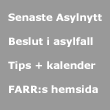ASYLNYTT
Sponsrad av Fridh Advokatbyrå
ARKIV:
EU:s flykting- och gränspolitik
Allmänt om migration, statistik

Asylnytt - Arkiv
EU:s flykting- och gränspolitik
Mottagande av barn och barns rättigheter
Information från myndigheter och organisationer
Pressklipp saknas
- Arkiveringsdatum 210111:
- Child Rights Strategy should support undocumented children and adulthood transition
- Arkiveringsdatum 191002:
- ECRE: Guidance to respect children's rights in return policies and practices
Arkiveringsdatum 210111:
Picum 20-12-21:
Child Rights Strategy should support undocumented children and adulthood transition
To be effective, the EU's Child Rights Strategy should support undocumented children and their transition into adulthood
Children enjoy special rights under the UN Convention on the Rights of the Child, regardless of their residence status. However, the transition of undocumented children into adulthood often comes abruptly: rights and basic services are no longer guaranteed and measures are not taken to support undocumented young adults in their new reality.
The European Commission is currently developing the EU Child Rights Strategy as part of its agenda for 2019-2024. The strategy aims to protect and promote children's rights in the EU and to mainstream child rights in all relevant EU policy areas. It will serve as a policy framework that will cover all existing and future child rights policies under one umbrella. As President of the European Commission Ursula von der Leyen emphasized in her mission letter to Vice-President ?uica: "We need to invest more in the future of our children. [...] ensuring that children have access to the services they need and are supported through to their adult lives".
One of the policies proposed to reach this goal, which will receive funding as part of the EU Multiannual Financial Framework (MFF) for 2021-2027, is the Child Guarantee. This instrument is led by the Commission and backed by the Parliament, and will result in a non-binding Council Recommendation asking Member States to ensure "affordability, accessibility and availability of inclusive quality services for children in need." By urging Member States to provide children and their parents access to essential services, such as healthcare, education and housing, the Commission aims to tackle poverty among children in need and improve their wellbeing and development.
If the aim of both the Strategy and the Guarantee is to establish a solid foundation for children that will provide life-long benefits, they should also address children's transition into adulthood.
(...)
Läs mer och hämta ställningstagandet (Extern länk)
Arkiveringsdatum 200523:
FRA 20-05-11:
Relocation of unaccompanied children: challenges and good practices
Since 2015, thousands of boys and girls arrived to the EU without their parents. Almost 1,400 of these unaccompanied children have already been relocated from France, Greece, Italy and Malta to other EU Member States through relocation schemes. As a number of EU Member States have recently started relocating some children from Greece again, the EU Agency for Fundamental Rights (FRA) publishes a report highlighting the challenges and good practices of past relocation programmes. This report will help national authorities to take measures that fully comply with the rights of children and are practically feasible at the same time.
FRA's report "Relocation of unaccompanied children: applying good practices to future schemes" highlights the challenges and good practices gathered in the implementation of different mandatory and voluntary relocation programmes since 2015.
The report focuses on key steps of the relocation procedure from the moment a child is identified for relocation to the child's integration in the Member State of destination.
Based on FRA's desk research and over 45 interviews with 72 representatives from national authorities, European institutions, international organisations and civil society organisations, the Agency calls on the EU and its Member States to consider the following four measures:
+ putting in place reasonable timelines for relocation of unaccompanied children that allow for the effective protection of the child;
+ using eligibility criteria based on the child's vulnerability and protection needs;
+ ensuring the child is supported by a legal guardian during all steps in the relocation;
+ maintaining family unity and facilitating family reunion if this is in the best interests of the child.
Background information:
FRA conducted the interviews between November 2019 and March 2020 in 10 EU Member States: Belgium, Finland, France, Germany, Greece, Ireland, Italy, Malta, the Netherlands and Portugal.
Arkiveringsdatum 200410:
FRA 20-03-30:
Migrant children continue to face serious risks across Europe
In a year that marked 30 years of the United Nation's child rights convention, 2019 saw many migrant children in the EU with their rights under threat. The latest report from the EU Agency for Fundamental Rights draws attention to the plight of migrant children as they enter and stay in the EU or return to their home countries.
The 'Children in migration in 2019' report looks at the migration situation in 2019. It pulls together the main issues identified in FRA's Quarterly Bulletins on migration in selected EU Member States.
In 2019, Member States apprehended over 140,000 migrants entering the EU unauthorised. About 33,000 were children. Over 5,000 were unaccompanied.
This exposes children to greater risk - the risk of violence, exploitation, trafficking and abuse.
The latest FRA report highlights the 10 main challenges migrant children face. These include:
1. The risk of death or injury when trying to enter the EU by sea or land.
2. Being stranded - In 2019, twice as many rescue vessels could not dock immediately compared to 2018. This left over 780 children stranded on board, often in bad weather and in poor health for over a week.
3. Being pushed back, sometimes violently, at the border without assessing whether they are at risk of persecution or danger. This contravenes international and EU law. Non-governmental organisations (NGOs) estimate that authorities pushed back at least 1,230 children on the Western Balkan route.
4. Not enough space in reception centres for asylum-seeking children, particularly unaccompanied children with special protection needs. This applied to Cyprus, France, Greece, Italy, Malta and Spain.
(...)
Hämta rapporten (Extern länk)
Arkiveringsdatum 191002:
ECRE 19-09-27:
Guidance to respect children's rights in return policies and practices
This week, an extensive guidance on respective children's rights in return policies and practices was published by UNICEF, the UN Human Rights Office (OHCHR), the International Organization for Migration (IOM), Save the Children, the Platform for International Cooperation on Undocumented Migrants (PICUM), the European Council for Refugees and Exiles (ECRE) and Child Circle.
The document provides guidance for state authorities on the design and implementation of return procedures that are child rights compliant. In particular, it sets out concrete measures necessary to ensure respect for the rights of every child, including children in families, when implementing return legislation and policy in Europe. It provides guidance to bring policy and legislation in line with international law obligations, in particular the UN Convention on the Rights of the Child (CRC), the EU Charter of Fundamental Rights, and the EU Return Directive where applicable. Accordingly, the guidance is targeting those designing and implementing return procedures.
The guidance is based upon the existing legal and policy framework, including the EU Return Directive and the revised Return Handbook. It also takes account of recommendations and actions in the 2010 - 2014 EU Action Plan on unaccompanied minors, and Commission Communication on the protection of children in migration of 12 April 2017. The guidance has been developed through a process of consultations, first among United Nations agencies and civil society experts on migration and children's rights, and then with EU agencies, the European Commission and member state representatives. It aims to serve as the basis for dialogue with state authorities in the context of EU return procedures from EU member states, complementing the 2017 revised Return Handbook.
(...)
Läs mer (Extern länk)
Källor: Informationen på denna sida är hämtad från följande källor (externa länkar): EU (kommissionen, ministerrådet, parlamentet och domstolen), Europarådet (mr-kommissionären, domstolen, kommittén mot tortyr), FN:s flyktingkommissariat UNHCR, FN:s kommitté mot tortyr m.fl. FN-organ, Sveriges Radio, SvT, andra svenska media via Nyhetsfilter och pressmeddelanden via Newsdesk, utländska media till exempel via Are You Syrious och Rights in Exile, internationella organisationer som Amnesty International, Human Rights Watch, ECRE, Statewatch och Picum, organisationer i Sverige som Rädda Barnen, Asylrättscentrum, Svenska Amnesty, FARR och #vistårinteut samt myndigheter och politiska organ som Migrationsverket, Sveriges domstolar, JO, Justitiedepartementet m.fl. departement och Sveriges Riksdag.
Bevakning: Hjalte Lagercrantz och Sanna Vestin. Sammanställning: Sanna Vestin. Asylnytt är ett ideellt projekt. Sponsring avser prenumerationsavgifter. Tips emottages tacksamt.

 innehåll
innehåll